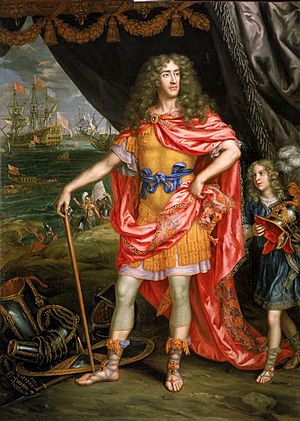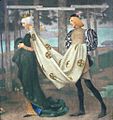Page-boy facts for kids
A page is usually a young boy or young man who works as a helper or assistant. The word "page" can mean two main things:
- A young male servant who helps in a home or for an important person.
- A young boy who helps the bride at a wedding. This is often called a "page boy."
Contents
Pages in History
Medieval Pages: Training for Knights
Long ago, especially during the Middle Ages, a page was a young boy who served a knight. Knights were important warriors. Pages would help the knight with many tasks, like cleaning their armor or carrying messages. They also began to learn how to fight and ride horses.
When a page turned about 14 years old, he would often become a squire. A squire was a knight's personal assistant and shield-bearer. He would learn more advanced fighting skills. If a squire proved himself brave and skilled, he might become a knight himself around the age of 21.
Pages were generally treated well. They were seen as part of the household and were being trained for important roles. For example, in the old Christmas carol "Good King Wenceslas," the king asks his page to stand by him and help him.
Decorative Pages: A Historical Trend
During the Renaissance and for several centuries after, it became popular for wealthy families to have young boys, often of African descent, as "decorative pages." These boys wore fancy costumes and served important ladies and lords. They were seen as a sign of wealth and status.
This custom of having an "African page" was a trend that lasted for a long time. Today, this type of decorative page is almost never seen.
Images for kids
-
Lord Patten, robed as Chancellor of Oxford University, assisted by a page.
-
Alof de Wignacourt and his page, by Caravaggio, c. 1608.
-
The Queen and the Page, by Marianne Stokes, 1896.
See also
 In Spanish: Paje para niños
In Spanish: Paje para niños






